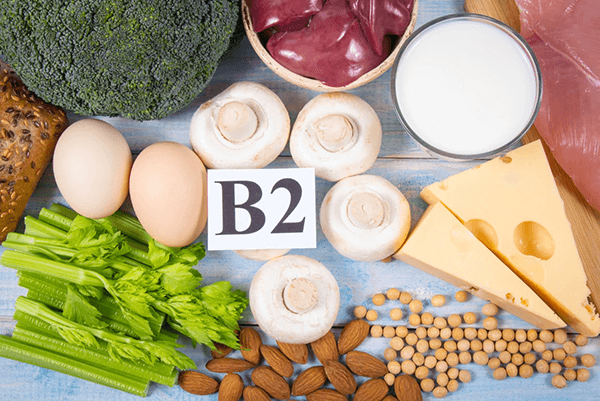- +033 2572 7171
- info@dhanvantary.com

4.5 Rating | 4500 Review

4.5 Rating | 4500 Review
Vitamin B2, commonly referred to as riboflavin, is a water-soluble vitamin essential for the conversion of carbohydrates into glucose, which is subsequently utilized for energy production. This vitamin was initially identified as a yellow-green pigment present in milk.

Riboflavin is one of the eight B vitamins and offers several advantages, including:
Vitamin B2 can be found in various foods, including milk, meat, eggs, nuts, enriched flour, and green vegetables. Other sources include almonds, whole grains, wild rice, brewer’s yeast, mushrooms, spinach, and organ meats. Certain foods, such as flours and cereals, are often fortified with riboflavin. It is important to store milk in opaque containers and protect it from direct sunlight, as riboflavin is sensitive to light and can be degraded by exposure.
Symptoms of Riboflavin Deficiency and Related Conditions
The deficiency of riboflavin manifests through various symptoms, including gastrointestinal issues, angular cheilitis (cracking at the corners of the lips), photophobia (sensitivity to light), stunted growth, and inflammation of the throat. Insufficient riboflavin can lead to ocular damage, particularly affecting the lens and potentially resulting in cataracts. This vitamin plays a crucial role in the prevention of cervical cancer and migraine headaches, and it is also utilized in the treatment of blood disorders such as congenital methemoglobinemia and red blood cell aplasia. Additionally, riboflavin is beneficial for managing conditions like acne, muscle cramps, and burning feet syndrome. In summary, riboflavin is essential for the optimal development and functioning of the skin, the lining of the digestive tract, blood cells, and various other bodily systems.
For females aged up to 18 years, the advised daily intake of riboflavin is 1 mg, while for males, it is 1.3 mg. pregnant women require a higher intake of 1.4 mg, and breastfeeding women need 1.6 mg of riboflavin. Generally, riboflavin is considered safe even at elevated doses; however, excessive consumption may lead to side effects such as itching, burning sensations, light sensitivity, numbness, and a yellow-orange discoloration of urine. High doses may also result in diarrhea.
Riboflavin is typically included in B-complex vitamins and various multivitamin supplements, particularly for individuals who do not maintain a balanced diet. These supplements can help prevent riboflavin deficiency. When taken in conjunction with Vitamin A, riboflavin may enhance growth, fertility, and visual acuity.
